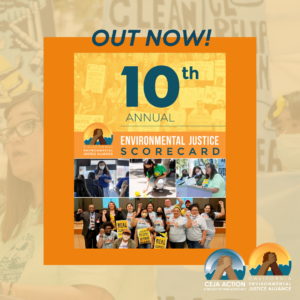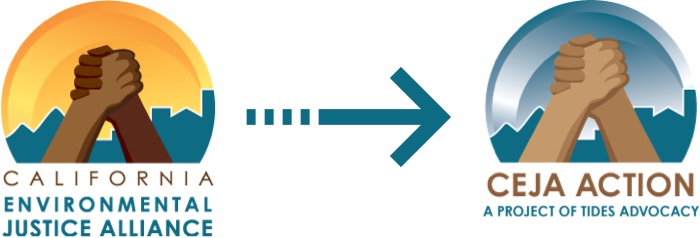OUT NOW: 2022 Legislative Scorecard
Big Progress, Serious Concerns
Ten years after CEJA released our first environmental justice scorecard, we have seen incredible progress in lawmakers’ awareness of environmental and climate justice issues. In 2022, grassroots organizing and advocacy propelled four of our priority bills onto the governor’s desk, and three were signed into law.
But major challenges continued. As the embattled oil and gas and real estate lobbies funneled millions of dollars into stalling climate and housing justice action in Sacramento, legislators too often voted against the well-being of working Californians. In 2022, fewer legislators received “A” grades than in previous years and the cumulative scores for the Black, Latino, and Asian American & Pacific Islander Caucuses fell as well. The last-minute push to pass a comprehensive package of climate legislation, combining both positive elements and significant compromises and with details finalized in fast-moving negotiations, made the work of representing California’s environmental justice communities extremely difficult.
Download the 2022 Scorecard here!

The good: Four environmental justice bills passed the legislature and three were signed into law:
✅ Ban on carbon capture for the purposes of enhanced oil recovery, in order to prevent increased pollution in California communities with SB 1314 (Limón)
✅ Health and safety buffer zones between oil and gas drilling sites & homes, schools and hospitals with SB 1137 (Limón)
✅ Community storage and solar to help close California’s clean energy gap between the wealthy and the rest of California, helping working class families save money on energy bills while unplugging from dirty energy with AB 2315 (Ward)
🔁 While the bill to create mandatory cooling and safe indoor air temperatures died in the legislature (SB 2597, Bloom), a cooling standard was adapted into the state budget.
Legislative Champions
 Senators Limón, Gonzalez, and Asm. Bryan championed the bill to create 3,200 ft. buffer zones between oil and gas wells and peoples’ homes, hospitals, schools, and prisons. These three lawmakers distinguished themselves with their sustained commitment, partnership, and ability to work together with other legislators to pass the buffer zones bill.
Senators Limón, Gonzalez, and Asm. Bryan championed the bill to create 3,200 ft. buffer zones between oil and gas wells and peoples’ homes, hospitals, schools, and prisons. These three lawmakers distinguished themselves with their sustained commitment, partnership, and ability to work together with other legislators to pass the buffer zones bill.
All three of these lawmakers also championed other environmental justice priorities in 2021 and 2022: the ban on enhanced oil recovery (SB 1314, Limón); legislation (which unfortunately failed to pass) to add an environmental justice member to the South Coast Air Quality Management District (SB 342, Gonzalez); and the thwarted bill to ensure equitable access to federal funds for environmental justice residents (AB 2419, Bryan).
The bad: $30 million in oil money lobbying in 2022. Lower grades across the legislature.
The neighborhood oil drilling ban is already under attack by the oil and gas industry. The oil lobby has spent $20 million in an attempt to roll back this buffer zones bill alone — and bring any action on the legislation to a standstill until 2024. This will be a continuing fight in 2023 and beyond.
Legislators’ overall scores for 2022 trended downward, showcasing what a mixed bag the year was for environmental justice. The highs of finally passing health and safety buffer zones, in partnership with EJ champions new and old, could not outweigh the negative impacts of passing bills to undercut the California Environmental Quality Act, weakening this critical environmental justice protection. Additionally, the compromises demanded by the governor’s climate package also served to lower scores, with decision makers approving legislation setting new emissions targets without addressing direct emission reductions or correcting reliance on dirty dairy biogas.
Carbon capture and storage:
Carbon capture and storage (CCS) is the practice of capturing CO2 from industrial smokestacks or power generators and transporting it by pipelines to sites where it is pumped underground for storage. This technology, shown to have an 80% failure rate, represents the latest attempt by fossil fuel companies to greenwash their industry and maintain use of dirty fossil fuels indefinitely. In 2022, industry fingerprints were all over the legislative session. From January to June, fossil fuel industry lobbyists and aligned business interests spent $13.7 million lobbying the legislature, the governor’s office, and the California Air Resources Board to push carbon capture and storage technologies in lieu of real climate action. This money showed up in bad bills streamlining CCS in California and in the climate package that, alongside major positive elements, also included huge concessions to the fossil fuel industry and its CCS agenda.
Looking forward to 2023:
Thirty-two new legislators arrived in Sacramento in January, presenting new opportunities for partnership. CEJA is excited to work with this new class of legislative leaders on critical climate justice, energy equity, and healthy land use issues in 2023. Central to this work will be protecting critical wins from previous years, including resisting the oil industry’s campaign to repeal buffer zones and fighting proposed cuts to environmental justice priorities in the budget. CEJA looks forward to creating healthy and just land use policy that prioritizes community health, engagement, and partnership.

